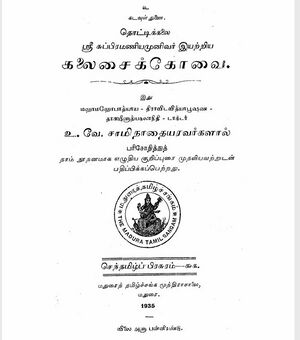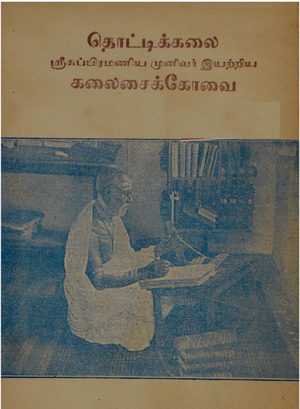Thottikalai Subramania Munivar: Difference between revisions
No edit summary |
Cyril.alex (talk | contribs) No edit summary |
||
| Line 1: | Line 1: | ||
{{Read Tamil|Name of target page=தொட்டிக்கலை சுப்பிரமணிய முனிவர்|Title of target page=தொட்டிக்கலை சுப்பிரமணிய முனிவர்}}[[File:Kalaisai2.jpg|alt=Kalaisai Kovai|thumb|Kalaisai Kovai]] | {{Read Tamil|Name of target page=தொட்டிக்கலை சுப்பிரமணிய முனிவர்|Title of target page=தொட்டிக்கலை சுப்பிரமணிய முனிவர்}}[[File:Kalaisai2.jpg|alt=Kalaisai Kovai|thumb|Kalaisai Kovai]] | ||
Thottikalai Subramania Munivar (1740 - 1810) has composed many keerthanas | Thottikalai Subramania Munivar (1740 - 1810) has composed many keerthanas(religious songs) and viruththams(type of verse). He followed Saiva philosophy and was student of Shivagnana Munivar. His work includes books like Kalaisaikovai, Thiruthanigai Thiruviruththam, Kalaisai Chidambaresar Vannam. Till fifty (50) years ago, his Kalaisai Siledai Venpa was used as reference by musicians. | ||
=== Birth, Education === | === Birth, Education === | ||
Thottikalai Subramania Munivar was born in the year 1740 in Kattumannarkovil Vellalar community. | Thottikalai Subramania Munivar was born in the year 1740 in Kattumannarkovil Vellalar community. | ||
He learnt Tamil grammar and | He learnt Tamil grammar and Saiva philosophy texts from Shivagnana Munivar who has written ''Sivagnana Bodhaga Perurai''. He went on to become expert in ''Cheyyul'' (traditional-styled verses). | ||
=== Personal Life === | === Personal Life === | ||
Early in his life, he got | Early in his life, he was blessed to be an ascetic and got religious instructions from Lord Ambalavanar of ''Thiruvaduthurai Adheenam'' (head of Siva mutt) and also served as poet in his court <ref>[https://www.tamilvu.org/courses/hg200/hg204/html/hg204maa.htm Tamil Virtual University]</ref>. He was bestowed title of ''Madhurakavi'' for his scholarship. Later realizing that scholars were not properly respected in the monastery, he moved to a place called Kalasai (also known as Thottikalai) and stayed along with Sivagnana Swami. He was also patronized by Thottikalai Kesava Mudaliar and Vedachalai Mudaliar. | ||
=== Music Work === | === Music Work === | ||
Thottikalai Subramania Munivar has written and sung Pancharatna Malai containing twenty four (24) songs on his spiritual guru Ambalavana Desikar. Five keerthanas from this are given below. | Thottikalai Subramania Munivar has written and sung Pancharatna Malai containing twenty four (24) songs on his spiritual guru Ambalavana Desikar. Five keerthanas from this are given below. | ||
| Line 14: | Line 14: | ||
# Theme - Annavidu Thudhu - Anjame Enakkoru Thanjame Yaagi Ni Poi Alangal Konarnthaal Ullam Kalangene, Ragam - Dwijavanthi | # Theme - Annavidu Thudhu - Anjame Enakkoru Thanjame Yaagi Ni Poi Alangal Konarnthaal Ullam Kalangene, Ragam - Dwijavanthi | ||
# Theme - Kilividu Thudhu - Killaye Mayatru Kollaiye Yarakk Kallaye Sori Kaavitharai Kettu Ni Vaangikka, Ragam - Maanji, Talam - Atatala | # Theme - Kilividu Thudhu - Killaye Mayatru Kollaiye Yarakk Kallaye Sori Kaavitharai Kettu Ni Vaangikka, Ragam - Maanji, Talam - Atatala | ||
When his guru Sivagnana Swamigal attained salvation, his keerthana "Ninaithatra Sagikka Pomo" (1785) became popular. Apart from this, he has composed and sung few other Chindu and Kanni. There is a monastery (Madam) constructed for him in Kalaisai and it is named as Saamiyar Madam. [[File:Kalaisai.png|alt=Kalasai Kovai|thumb|Kalasai Kovai - U. V. Swaminatha Iyer (In Photograph - U.V.Sa.)]] | When his guru Sivagnana Swamigal attained salvation, his keerthana "''Ninaithatra Sagikka Pomo''" (1785) became popular. Apart from this, he has composed and sung few other Chindu and Kanni (types of verses). There is a monastery (Madam) constructed for him in Kalaisai and it is named as Saamiyar Madam. [[File:Kalaisai.png|alt=Kalasai Kovai|thumb|Kalasai Kovai - U. V. Swaminatha Iyer (In Photograph - U.V.Sa.)]] | ||
=== Death === | === Death === | ||
He died in the year 1810. | He died in the year 1810. | ||
=== Creation === | === Creation === | ||
Thottikalai Subramania Munivar has written many books which include more than thirty (30) small books and major works like Thiruvaduthurai Kovai and Kalasai Kovai. His ''Avinangudi Pathitrupadanthadi'' was published first in 1790. From old palm leave manuscripts, below are the believed to be his works. | |||
Published works: | Published works: | ||
* Kalaisai Kovai - Was reviewed and prefaced by U. V. Swaminatha Iyer. | * Kalaisai Kovai - Was reviewed and prefaced by [[U.V. Swaminatha Iyer|U. V. Swaminatha Iyer]]. | ||
* Kalaisai Siledai Venba | * Kalaisai Siledai Venba | ||
* Kalaisai Chidambaresar Bharani | * Kalaisai Chidambaresar Bharani | ||
| Line 57: | Line 57: | ||
[[Category:English Content]] | [[Category:English Content]] | ||
[[Category:Musicians]] | [[Category:Musicians]] | ||
{{ | {{Finalised-en}} | ||
Revision as of 21:59, 12 October 2022
இந்தப் பக்கத்தை தமிழில் வாசிக்க: தொட்டிக்கலை சுப்பிரமணிய முனிவர்
Thottikalai Subramania Munivar (1740 - 1810) has composed many keerthanas(religious songs) and viruththams(type of verse). He followed Saiva philosophy and was student of Shivagnana Munivar. His work includes books like Kalaisaikovai, Thiruthanigai Thiruviruththam, Kalaisai Chidambaresar Vannam. Till fifty (50) years ago, his Kalaisai Siledai Venpa was used as reference by musicians.
Birth, Education
Thottikalai Subramania Munivar was born in the year 1740 in Kattumannarkovil Vellalar community.
He learnt Tamil grammar and Saiva philosophy texts from Shivagnana Munivar who has written Sivagnana Bodhaga Perurai. He went on to become expert in Cheyyul (traditional-styled verses).
Personal Life
Early in his life, he was blessed to be an ascetic and got religious instructions from Lord Ambalavanar of Thiruvaduthurai Adheenam (head of Siva mutt) and also served as poet in his court [1]. He was bestowed title of Madhurakavi for his scholarship. Later realizing that scholars were not properly respected in the monastery, he moved to a place called Kalasai (also known as Thottikalai) and stayed along with Sivagnana Swami. He was also patronized by Thottikalai Kesava Mudaliar and Vedachalai Mudaliar.
Music Work
Thottikalai Subramania Munivar has written and sung Pancharatna Malai containing twenty four (24) songs on his spiritual guru Ambalavana Desikar. Five keerthanas from this are given below.
- Theme - Desikar's Pattana Pravesam (Entry in Madras) - Vanna Chivigaiyeri Vandaan, Ragam - Ananda Bhairavi, Talam - Atatala Chapu
- Theme - Megavidu Thudhu - Eera Mugile Maiyal Theerave Thudhu Sendrenakku Upagaram Seivai, Ragam - Kalyani, Talam - Adi
- Theme - Vanduvidu Thudhu - Manjariye Mana Manjariye Vaangiye Varuvai Ni Veguviraivai, Ragam - Mohanam
- Theme - Annavidu Thudhu - Anjame Enakkoru Thanjame Yaagi Ni Poi Alangal Konarnthaal Ullam Kalangene, Ragam - Dwijavanthi
- Theme - Kilividu Thudhu - Killaye Mayatru Kollaiye Yarakk Kallaye Sori Kaavitharai Kettu Ni Vaangikka, Ragam - Maanji, Talam - Atatala
When his guru Sivagnana Swamigal attained salvation, his keerthana "Ninaithatra Sagikka Pomo" (1785) became popular. Apart from this, he has composed and sung few other Chindu and Kanni (types of verses). There is a monastery (Madam) constructed for him in Kalaisai and it is named as Saamiyar Madam.
Death
He died in the year 1810.
Creation
Thottikalai Subramania Munivar has written many books which include more than thirty (30) small books and major works like Thiruvaduthurai Kovai and Kalasai Kovai. His Avinangudi Pathitrupadanthadi was published first in 1790. From old palm leave manuscripts, below are the believed to be his works.
Published works:
- Kalaisai Kovai - Was reviewed and prefaced by U. V. Swaminatha Iyer.
- Kalaisai Siledai Venba
- Kalaisai Chidambaresar Bharani
- Thiruvaduthurai Kovai
- Sivagnana Munivar Thudhi Viruththangal
- Sivagnana Munivar Keerthanaigal
Unpublished works:
- Kalaisai Chidambaresar Sannidhimurai (19 Prabanthams)
- Kalaisai Chidambaresar Vannam
- Kalaisai Chidambaresar Pancharathnam
- Kalaisai Chidambaresar Kattiyam
- Kalaisai Sivakamiammai Pancharathnam
- Thirukuttala Chitrasabhai Thiruviruththam
- Pazhani Kuzhandaivelar Pancharathna Malai
- Sri Subramaniar Thiruviruththam
- Thiruthanigai Thiruviruththam
- Varuda Thirumullai Vayitrukodiyidaiammai Pillai Tamizh
- Ayalur Murugar Pillai Tamizh
- Thiruchenditru Sandaviruththam
- Avinangudi Kailayanathar Pathitrupathandadi
- Thirumaligai Thevar Thiruviruththangal
- Thiruchitrambala Desikar Chindu
- Thiruchitrambala Desikar Sandaviruththam
- Ambalavana Desikar Pancharathna Malai
- Ambalavana Desikar Vannam
- Ambalavana Desikar Ananda Kalippu
Kalasai is another name of Thottikalai.
Links
- Tamil Isai Ilakkiya Varalaaru - Mu. Arunachalam
- Thottikalai Sri Subramania Munivar's Kalaisaikovai
- Contribution to Tamil by Thottikalai
- http://thamaraithamil.blogspot.com/2014/11/1.html
Footnote
✅Finalised Page


